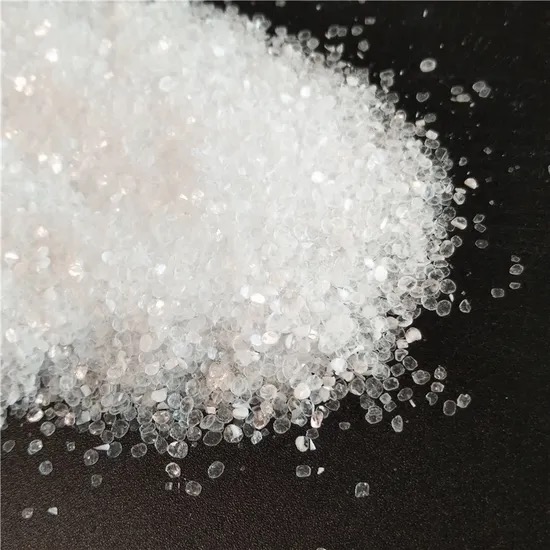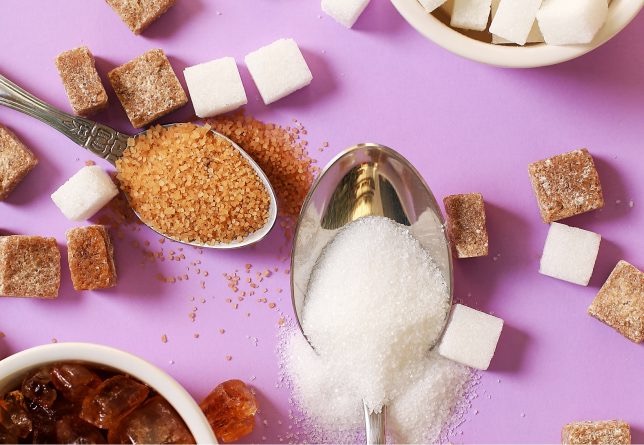Views: 222 Author: Sara Publish Time: 2025-08-29 Origin: Site








Content Menu
● Understanding Blood Sugar and Glycemic Index
● Natural Sweeteners That Do Not Raise Blood Sugar
>> Stevia
>> Allulose
● Functional Polyols and Their Benefits
>> Additional Benefits of Polyols
● Dietary Fibers in Sweetener Blends
● Sugar Alcohol Comparison: Understanding Their Glycemic Impact
● Manufacturing Considerations for Blood Sugar-Friendly Sweeteners
● Developing Sweetener Blends for Low Glycemic Response
● OEM/ODM Sweetener Solutions for Manufacturers
● FAQ
>> 1. What sweeteners have zero impact on blood sugar?
>> 2. Can sugar alcohols raise blood sugar?
>> 3. Are natural sweeteners safe for diabetics?
>> 4. How do dietary fibers help in controlling blood sugar?
>> 5. What services can sweetener manufacturers provide to food companies?
In today's health-conscious world, more people than ever are monitoring their blood sugar levels closely. Whether for managing diabetes, preventing insulin spikes, or simply maintaining a balanced diet, choosing the right sweetener is critical. But what sweetener does not raise blood sugar? This comprehensive article explores natural and functional sweeteners, their impact on glycemic response, and their roles in food, beverage, and healthcare industries. For manufacturers and formulators looking to develop healthier products, understanding which sweeteners are blood sugar-friendly is essential.

Blood sugar, or glucose, is the primary energy source for the body's cells. After consuming carbohydrates or sweeteners, glucose levels in the blood rise and stimulate insulin release to help cells absorb glucose. However, rapid spikes in blood sugar can be harmful, especially for people with diabetes or insulin resistance.
The Glycemic Index (GI) is a ranking of carbohydrate foods on a scale from 0 to 100 based on their effect on blood sugar levels. Pure glucose is assigned a GI of 100. Foods or sweeteners with a low GI release glucose more slowly into the bloodstream and cause minimal insulin spikes.
Choosing sweeteners with low or zero glycemic index helps:
- Manage or prevent type 2 diabetes
- Control weight and appetite
- Improve overall metabolic health
Because of these benefits, many food, beverage, and healthcare manufacturers seek sweeteners that do not raise blood sugar or have minimal impact.
Stevia is a natural non-nutritive sweetener derived from the leaves of the *Stevia rebaudiana* plant. It is approximately 200–300 times sweeter than sugar but contains no calories and has a glycemic index of zero.
- Why Stevia?
It does not metabolize into glucose, making it suitable for diabetic-friendly formulations.
- Applications:
Beverages, dietary supplements, confectionery, and pharmaceuticals.
Monk fruit extract contains mogrosides, compounds that provide intense sweetness without raising blood sugar.
- Advantages:
Zero calories, zero glycemic impact, and antioxidant properties.
- Use in Industry:
Used in beverages and healthy snacks as a clean-label sweetener.
Allulose is a rare sugar found in small quantities in foods like figs and raisins. It provides about 70% of the sweetness of sucrose but with very few calories and a negligible effect on blood sugar.
- Health Benefits:
Studies suggest it can help reduce blood sugar and insulin levels.
- Food Applications:
Used in baked goods, beverages, and frozen desserts.

Polyols or sugar alcohols are a widely used functional sweetener category in the healthcare and food industries. Besides erythritol, other common polyols include xylitol, maltitol, sorbitol, and isomalt. Their glycemic impact varies considerably:
isomalt. Their glycemic impact varies considerably:
| Polyol | Approximate GI | Blood Sugar Impact |
|---|---|---|
| Erythritol | 0 | Does not raise blood sugar |
| Xylitol | 7 | Minimal blood sugar increase |
| Sorbitol | 9 | Minimal impact |
| Isomalt | 2 | Very minimal impact |
| Maltitol | 35 | Moderate impact |
Among these, erythritol is most favored for zero glycemic response and digestive tolerance at moderate doses. Xylitol and sorbitol have low GIs but can cause gastrointestinal discomfort in some people if consumed in large quantities.
- They provide bulk and texture similar to sugar.
- Many polyols possess dental health benefits by inhibiting cavity formation.
- They have cooling effects that enhance sensory attributes in some products.
Increasingly, manufacturers incorporate dietary fibers such as inulin, resistant maltodextrin, polydextrose, and soluble corn fiber into sweetener blends. These fibers have minimal effects on blood sugar and provide numerous health benefits:
- Improve gut microbiota and bowel function
- Slow glucose absorption, helping regulate blood sugar and insulin response
- Increase satiety and help control calorie intake
- Enhance texture and mouthfeel in food formulations
By combining fibers with sweeteners, formulators create multi-functional sugar alternatives that avoid blood sugar spikes while improving the nutritional profile and sensory characteristics of foods and beverages.
Not all sugar alcohols are created equal in terms of blood sugar impact. It is critical for manufacturers to select the appropriate polyol based on the desired final product attributes and target consumer group.
- Erythritol:
Completely absorbed in the small intestine but excreted unchanged in urine, causing almost no caloric intake or glycemic effect.
- Xylitol and Sorbitol:
Partially absorbed and metabolized, producing a small glycemic response but generally safe for diabetics in moderate amounts.
- Maltitol:
Has a higher glycemic index and can raise blood sugar significantly more than other polyols, so it is less suitable for glycemic management.
Summary: For sweeteners that do not raise blood sugar, erythritol is often the first choice, sometimes enhanced by blending with natural high-intensity sweeteners such as stevia or monk fruit for optimal sweetness and clean taste.
When developing sweetener blends that do not raise blood sugar, manufacturers must consider several technical and regulatory factors:
- Purity and Source: Ensuring the sweetener is of high purity and sourced from natural ingredients aligns with market demand for clean-label products.
- Stability: Some natural sweeteners are sensitive to heat or pH changes; optimizing blend formulations helps maintain sweetness over shelf life.
- Taste Profile: Combining multiple sweeteners often balances sweetness and minimizes aftertastes like bitterness or cooling effects.
- Digestive Tolerance: Polyols in high doses can cause digestive discomfort; dose management and selecting better-tolerated polyols like erythritol help improve consumer acceptability.
- Compliance: Meeting international food safety and labeling regulations is essential for export and global market access.
Being a factory specialized in sweeteners, we enable manufacturers worldwide by offering tailored formulation development that integrates our expertise in natural sweeteners, functional polyols, and dietary fibers.
Blending various sweeteners offers balanced sweetness, reduced aftertaste, and improved stability. Manufacturers often combine stevia or monk fruit with erythritol and dietary fibers to:
- Minimize blood sugar elevation
- Achieve clean taste profiles
- Enhance product functionality and shelf life
Successful sweetener blends typically have:
- A sugar-like bulk sweetener (polyol or fiber) as the base
- A high-intensity natural sweetener to reduce polyol dosage
- Additional functional ingredients like dietary fibers for health benefits
Our factory specializes in customizing sweetener blends to meet international manufacturers' needs, focusing on blood sugar-friendly, natural, and functional solutions. We also provide tablet production and OEM/ODM services tailored to client formula requirements, ensuring consistent quality and regulatory compliance.
Our advanced manufacturing capabilities allow us to offer:
- Custom sweetener blend formulation: Tailored to meet specific glycemic targets and taste profiles.
- Tablet production: For supplements or functional food delivery formats.
- Flexible OEM/ODM services: Supporting international brands with compliant, quality solutions.
- Raw material sourcing: Including natural sweeteners, polyols, and dietary fibers.
By partnering with our factory, manufacturers benefit from cutting-edge technology and extensive expertise in developing innovative sweetener products that do not raise blood sugar, fulfilling consumer demand for healthier, low-glycemic options.
Choosing the right sweetener that does not raise blood sugar is essential in today's health-focused food, beverage, and healthcare markets. Natural sweeteners like stevia, monk fruit, and allulose, combined with functional polyols such as erythritol, offer excellent alternatives with minimal or zero glycemic impact. Incorporating dietary fibers further enhances these blends by promoting gut health and improving the nutritional value of products.
For manufacturers seeking reliable, customized low-glycemic sweetener solutions, partnering with experienced suppliers offering OEM/ODM services is critical. These collaborations enable the development of delicious, health-conscious products supporting blood sugar control and metabolic well-being, meeting the growing global demand for healthier sweetening options.

Answer: Stevia, monk fruit, erythritol, and allulose are examples of sweeteners that do not raise blood sugar levels.
Answer: Most sugar alcohols have a low glycemic index; erythritol specifically has a glycemic index of zero, meaning it does not raise blood sugar. However, maltitol has a moderate impact and should be used cautiously.
Answer: Yes, natural sweeteners like stevia and monk fruit are widely considered safe and beneficial for people managing diabetes, as they do not cause blood sugar spikes.
Answer: Dietary fibers slow glucose absorption into the bloodstream and improve insulin sensitivity, helping regulate blood sugar levels and supporting digestive health.
Answer: Manufacturers can provide custom blend development, tablet production, OEM/ODM services, and sourcing of natural and functional sweeteners to meet comprehensive formulation needs.
